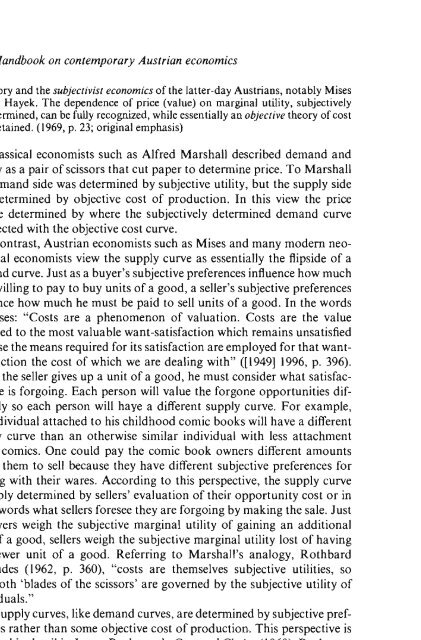Handbook on Contemporary Austrian Economics
Handbook on Contemporary Austrian Economics
Handbook on Contemporary Austrian Economics
You also want an ePaper? Increase the reach of your titles
YUMPU automatically turns print PDFs into web optimized ePapers that Google loves.
46 <str<strong>on</strong>g>Handbook</str<strong>on</strong>g> <strong>on</strong> c<strong>on</strong>temporary <strong>Austrian</strong> ec<strong>on</strong>omics<br />
theory and the subjectivist ec<strong>on</strong>omics of the latter-day <strong>Austrian</strong>s, notably Mises<br />
and Hayek. The dependence of price (value) <strong>on</strong> marginal utility, subjectively<br />
determined, can be fully recognized, while essentially an objective theory of cost<br />
is retained. (1969, p. 23; original emphasis)<br />
Neoclassical ec<strong>on</strong>omists such as Alfred Marshall described demand and<br />
supply as a pair of scissors that cut paper to determine price. To Marshall<br />
the demand side was determined by subjective utility, but the supply side<br />
was determined by objective cost of producti<strong>on</strong>. In this view the price<br />
will be determined by where the subjectively determined demand curve<br />
intersected with the objective cost curve.<br />
In c<strong>on</strong>trast, <strong>Austrian</strong> ec<strong>on</strong>omists such as Mises and many modern neoclassical<br />
ec<strong>on</strong>omists view the supply curve as essentially the flipside of a<br />
demand curve. Just as a buyer's subjective preferences influence how much<br />
he is willing to pay to buy units of a good, a seller's subjective preferences<br />
influence how much he must be paid to sell units of a good. In the words<br />
of Mises: "Costs are a phenomen<strong>on</strong> of valuati<strong>on</strong>. Costs are the value<br />
attached to the most valuable want-satisfacti<strong>on</strong> which remains unsatisfied<br />
because the means required for its satisfacti<strong>on</strong> are employed for that wantsatisfacti<strong>on</strong><br />
the cost of which we are dealing with" ([1949] 1996, p. 396).<br />
When the seller gives up a unit of a good, he must c<strong>on</strong>sider what satisfacti<strong>on</strong><br />
he is forgoing. Each pers<strong>on</strong> will value the forg<strong>on</strong>e opportunities differently<br />
so each pers<strong>on</strong> will have a different supply curve. For example,<br />
the individual attached to his childhood comic books will have a different<br />
supply curve than an otherwise similar individual with less attachment<br />
to his comics. One could pay the comic book owners different amounts<br />
to get them to sell because they have different subjective preferences for<br />
parting with their wares. According to this perspective, the supply curve<br />
is simply determined by sellers' evaluati<strong>on</strong> of their opportunity cost or in<br />
other words what sellers foresee they are forgoing by making the sale. Just<br />
as buyers weigh the subjective marginal utility of gaining an additi<strong>on</strong>al<br />
unit of a good, sellers weigh the subjective marginal utility lost of having<br />
<strong>on</strong>e fewer unit of a good. Referring to Marshall's analogy, Rothbard<br />
c<strong>on</strong>cludes (1962, p. 360), "costs are themselves subjective utilities, so<br />
that both 'blades of the scissors' are governed by the subjective utility of<br />
individuals."<br />
So supply curves, like demand curves, are determined by subjective preferences<br />
rather than some objective cost of producti<strong>on</strong> . This perspective is<br />
explored in detail in James Buchanan's Cost and Choice (1969). Buchanan<br />
reaches the following c<strong>on</strong>clusi<strong>on</strong>s about the subjectivist noti<strong>on</strong> of cost:<br />
1. Most importantly, cost must be borne exclusively by the decisi<strong>on</strong>-maker; it<br />
is not possible for cost to be shifted to or imposed <strong>on</strong> others.

















